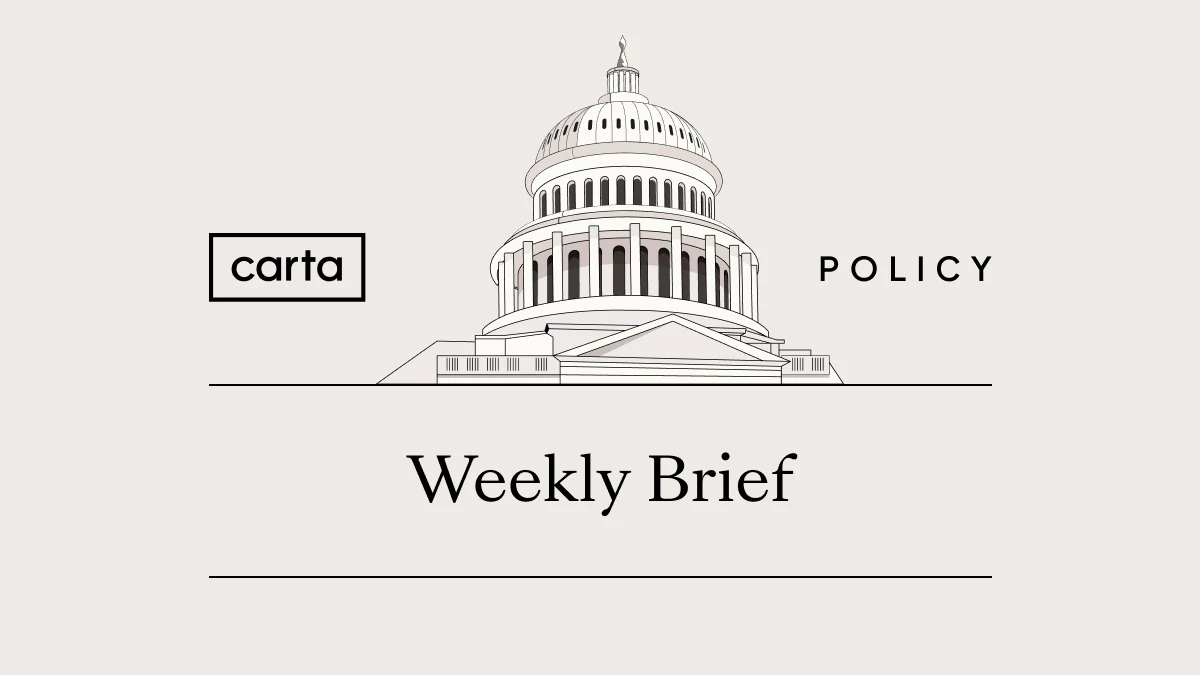- Senate Finance Democrats outline familiar 2025 tax priorities
- Topline
- SCOTUS upholds mandatory repatriation tax
- Senate Finance Committee Democrats outline familiar 2025 tax priorities
- Meta pauses plans to train AI using European users’ data
- IRS targets basis-shifting partnership transactions
- CA likely to approve delay in VC diversity disclosures this summer
- News to know
- Upcoming events
- Sign up below to receive Carta’s Policy Weekly Brief:
Topline
-
SCOTUS upholds mandatory repatriation tax
-
Senate Finance Democrats outline familiar 2025 tax priorities
-
Meta pauses plans to train AI using European users’ data
-
IRS targets basis-shifting partnership transactions
-
California likely to approve delay in VC diversity disclosures this summer
SCOTUS upholds mandatory repatriation tax
In a narrow decision, the Supreme Court upheld the constitutionality of the mandatory repatriation tax (MRT) imposed by the Tax Cuts and Jobs Act (TCJA). The issue underlying Moore vs. United States is whether income can be taxed before it is “realized.” The Moore case was one of the most closely watched tax cases in years, not because of the MRT, but as a bellwether for progressive wealth tax aspirations targeted at the unrealized gains of the highest income individuals. A narrow reading of the Sixteenth Amendment could have cast doubt on existing pillars of the tax code; a broad reading could have opened the door to progressive ideas to tax unrealized capital gains and wealth. The majority opinion, however, side-stepped many of these issues, leaving broader questions around realization unanswered by finding the income had been realized in this case.
Background: The TCJA created a MRT, which subjected U.S. shareholders to a one-time tax on undistributed earnings in foreign companies. The taxpayers challenged the constitutionality of this tax, arguing that income realization is necessary under the Sixteenth Amendment, and in this case, no realization event happened because the earnings had not been repatriated.
The decision: The 7-2 majority upheld the MRT as constitutional under the narrow circumstances of this particular case: income that had been realized by a foreign corporation could be attributed to its shareholders, even if it had not been distributed. Notably, the majority opinion avoided whether realization is necessary for a tax on income to be constitutional and explicitly states it is not addressing taxes on “holdings, wealth, or net worth.”
Why it matters: The Court explicitly declined to address the constitutionality of taxing wealth and unrealized capital gains, which, on the surface, seems to preserve progressive ambitions to levy such measures. However, a more in-depth reading of the Moore opinion casts doubt on the constitutionality of these progressive tax policy proposals. In the concurring and dissenting opinions, four conservative justices explicitly stated the government cannot tax unrealized income. This decision will likely become a common reference in the upcoming tax reform debate.
Senate Finance Committee Democrats outline familiar 2025 tax priorities
Senator Ron Wyden, Chair of the Senate Finance Committee, met with Democrats on the committee this week to align on priorities for the 2025 tax battle.
-
Wyden confirmed that Democrats are committed to raising taxes for wealthy individuals and multinational corporations, and are in the process of developing a series of options to close various loopholes and raise revenue.
-
The meeting also focused on the bipartisan tax agreement proposed by Senate Finance Committee Chair Ron Wyden and House Ways and Means Chair Jason Smith, which aims to expand the Child Tax Credit and reinstate important business tax breaks, including immediate R&D expensing. With elections approaching, Democratic members emphasized the importance of having Senate Majority Leader Chuck Schumer schedule a vote on this measure.
-
Sen. Elizabeth Warren echoed Wyden’s sentiment in a new speech, calling for an end to tax loopholes as she has long been a proponent for applying the ordinary income rate to carried interest and increasing funding for increased IRS enforcement.
What’s next: The 2025 expiration of a host of provisions from the Tax Cuts and Jobs Act (TCJA) is producing a flurry of activity around Washington as lawmakers begin to define their priorities. Carta is setting markers and advocating for provisions vital to the private capital ecosystem.
To get engaged, contact us at policy@carta.com.
Meta pauses plans to train AI using European users’ data
Meta confirmed this week that they will pause their plans to train a large language model (LLM) using public content shared by adults on Facebook and Instagram across the EU. This decision comes after Meta received pushback from the Irish Data Protection Commission (DPC), their main regulator in the EU.
-
Meta utilizes user content to train its AI in the U.S., but Europe’s stringent privacy regulations governed by the GDPR have created obstacles for tech companies, such as Meta, looking to quickly improve their AI systems.
-
U.S. companies operating in the EU are having to navigate how to gain user consent for their data—for example, Meta did not allow an “opt-out” option, instead requiring users to complete an objection form where they put forward their arguments for why they didn’t want their data to be processed, which is what led to the pushback from the Irish DPC.
Why it matters: Not only are these companies using AI having difficulty figuring out how to comply with GDPR regulations, but with the recent passage of the EU AI Act, U.S. companies operating in Europe are going to be dealt even more regulations governing their AI systems, which are set to come into full effect in May 2026. To learn more about these restrictions, read the Carta Policy team’s recent comparative analysis between the EU AI Act and U.S. AI regulation to date here:
 Read here
Read here
IRS targets basis-shifting partnership transactions
This week, the IRS released proposed guidance aimed at ending basis-shifting transactions used by partnerships that share common ownership for the sole purpose of deriving tax benefits. The IRS predicts that this new measure will likely raise more than $50 billion in revenue over 10 years. Key pieces of guidance include:
-
New proposed reporting regime for past and future basis adjustments: These proposed regulations are designed to stop basis shifting between related-party partnerships. These complex transactions involve stripping basis from assets where the basis is not generating tax benefits and moving the basis to assets where it will generate tax benefits without causing any meaningful change to the economics of the businesses—allowing closely related parties to avoid taxes.
-
Indication of further proposed regulations on future basis adjustments: The IRS notes further proposed regulations they plan to release that would effectively reduce or eliminate the benefit of related-party basis adjustment transactions.
-
Analysis of the IRS’s economic substance doctrine: The IRS noted that the economic substance doctrine will now be applied to certain related-party transactions that give rise to basis adjustments.
Why it matters: The announcement signals the IRS’s accelerating efforts in the partnership arena. If finalized, the proposed guidance would equip examiners with other selection methods and areas of focus for the agency’s large partnership compliance campaign to home in on, though some are calling the new guidance an “overreach” by the IRS adding increased complexity to an already burdensome reporting regime.
CA likely to approve delay in VC diversity disclosures this summer
Language to provide venture capital firms an additional year to comply with California’s new diversity disclosure requirements is expected to pass in conjunction with the state budget. Draft language on the delay was released by the administration in anticipation of its inclusion.
-
Under a new state statute, VC firms with a California nexus—virtually all VC firms—will have to survey their portfolio companies and report to the state on diversity metrics related to the founders of those companies, as well as financial data about investments made in diverse founders. These metrics will be published in a searchable online database
-
The Newsom administration has proposed extending the reporting deadline from March 1, 2025, until March 1, 2026, in addition to other changes.
What’s next: The state budget “trailer bills” in which the delay is expected to be included will be considered by the end of August. VC firms will likely get some temporary relief but should start thinking about implementation. Funds that do not comply could face significant monetary fines, but founders will be able to opt-out of providing such information without penalty.
News to know
-
House leaders release bipartisan privacy bill (Punchbowl)
-
CFPB loses new bid to get credit card fee rule case out of Texas (Reuters)
-
Stabenow eyes summer markup of crypto bill (Politico)
-
California Senate passes state’s version of Corporate Transparency Act (Lexology)
Upcoming events
-
June 24 - Commodities Futures Trading Commission (CFTC): Open Meeting
-
June 25 - Bloomberg Invest Summit: SEC Chair Gensler to participate in a one-on-one interview
-
June 26 - House Financial Services Committee hearing: Stress Testing: What’s Inside the Black Box?
-
June 26 - House Committee on Small Business hearing: Under the Microscope: Examining the Censorship-Industrial Complex and its Impact on American Small Businesses
-
June 27 - House Financial Services Committee hearing: The Role of the Export-Import (Ex-Im) Bank of the United States Amid Intensifying Economic Competition with China
-
June 27 - House Financial Services Committee hearing: Solutions in Search of a Problem: Chair Gensler’s Equity Market Structure Reforms
-
July 10 - Semafor event: Banking on the Future: The Next Era of FinTech

